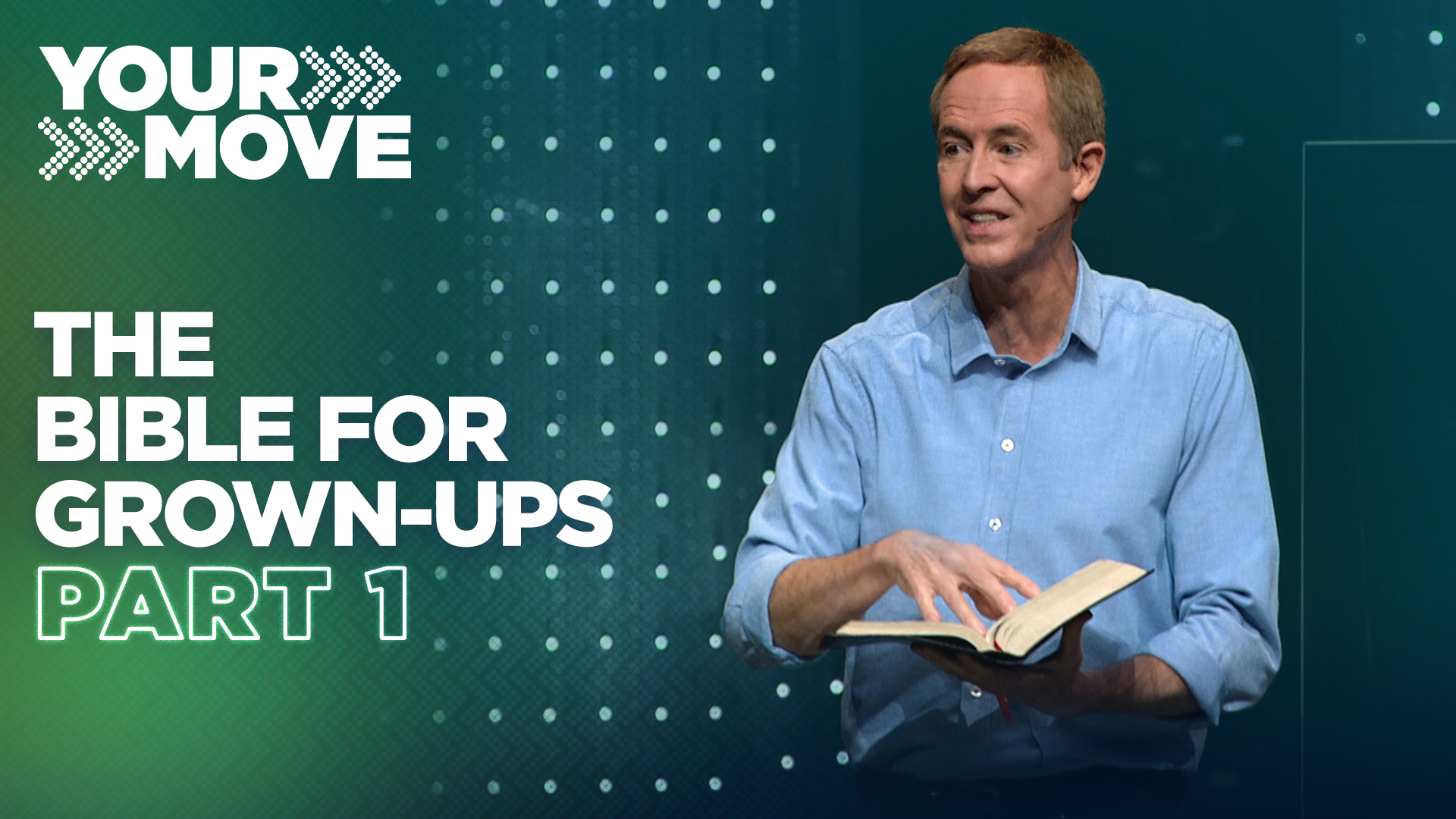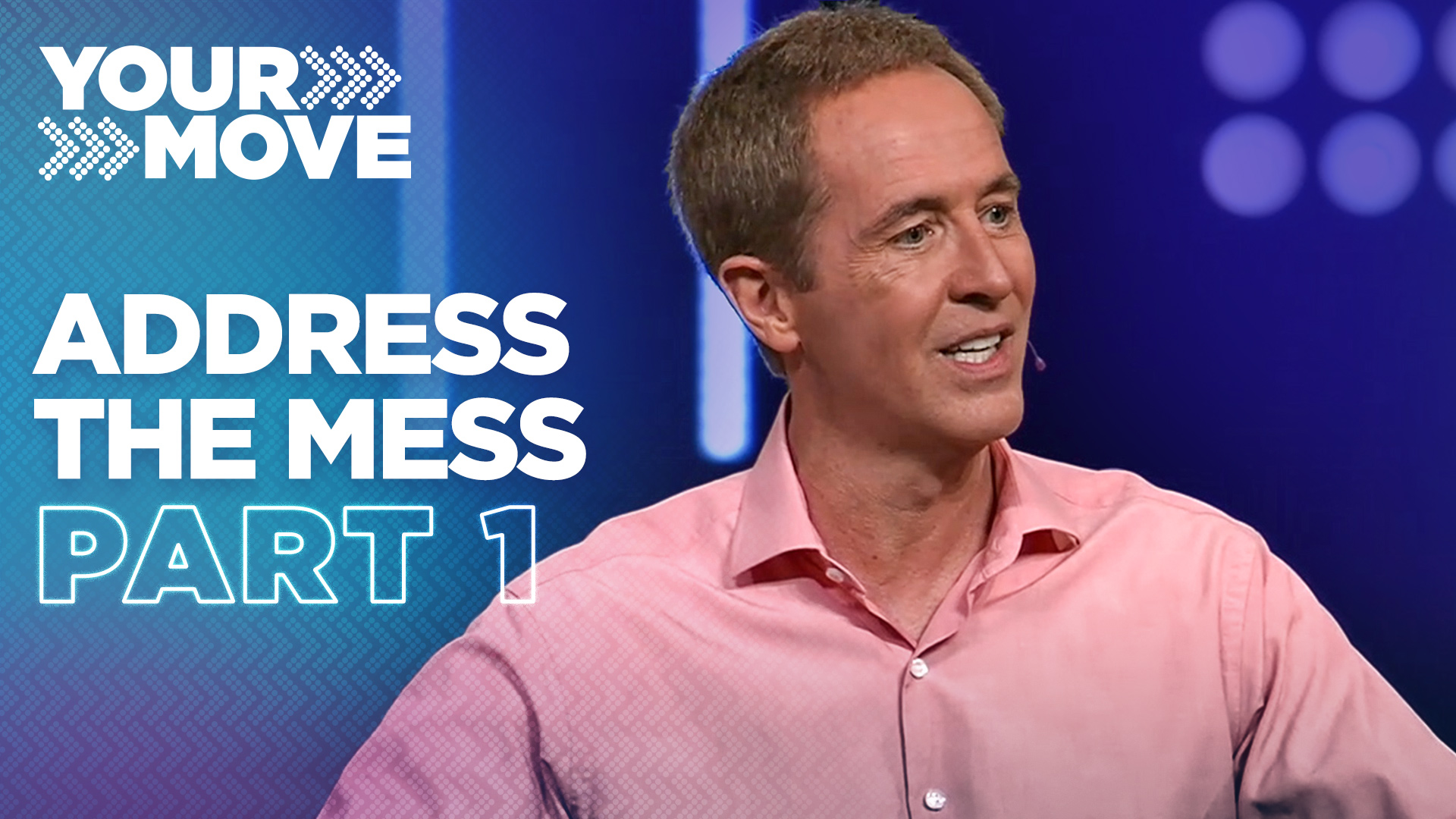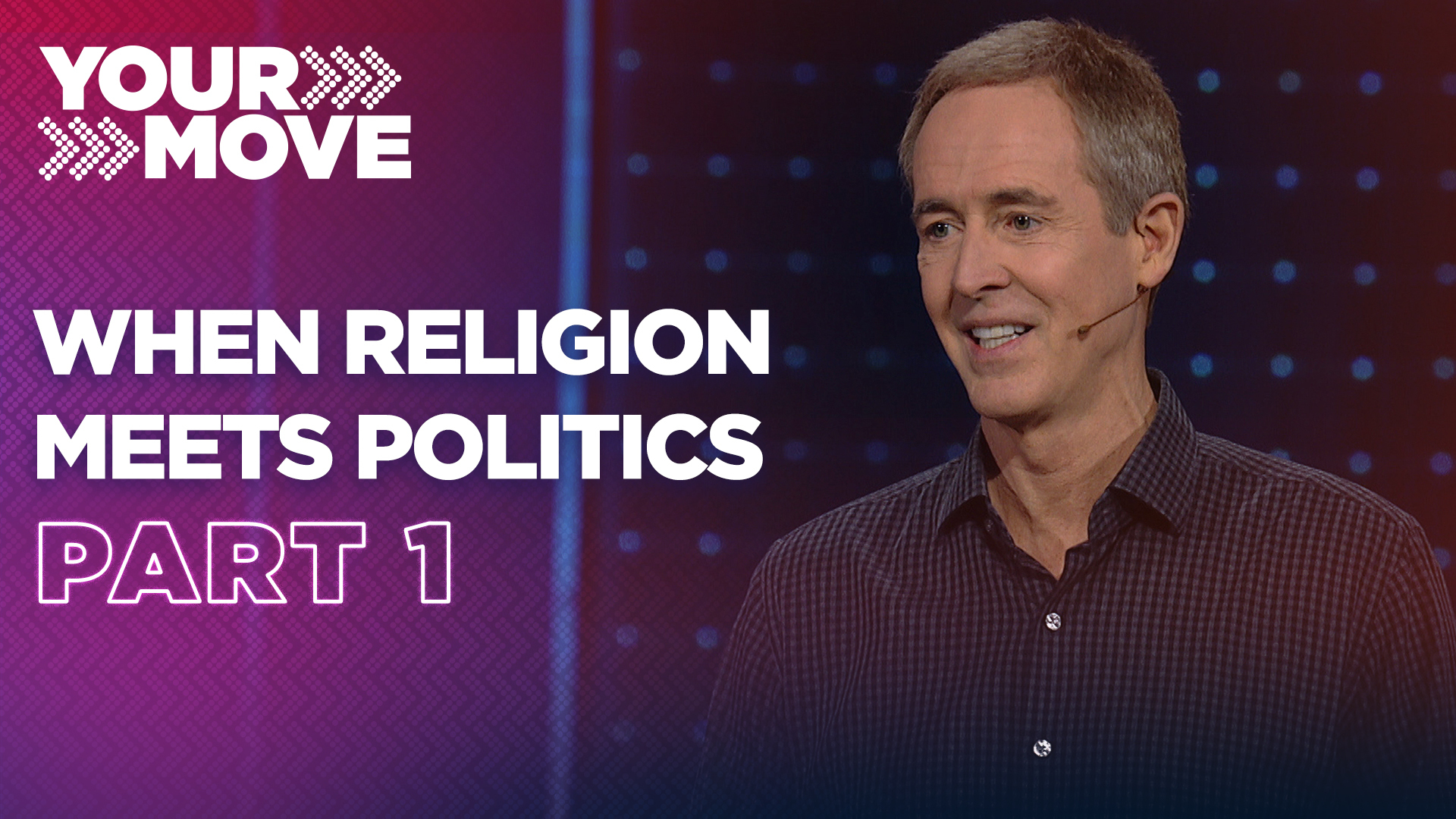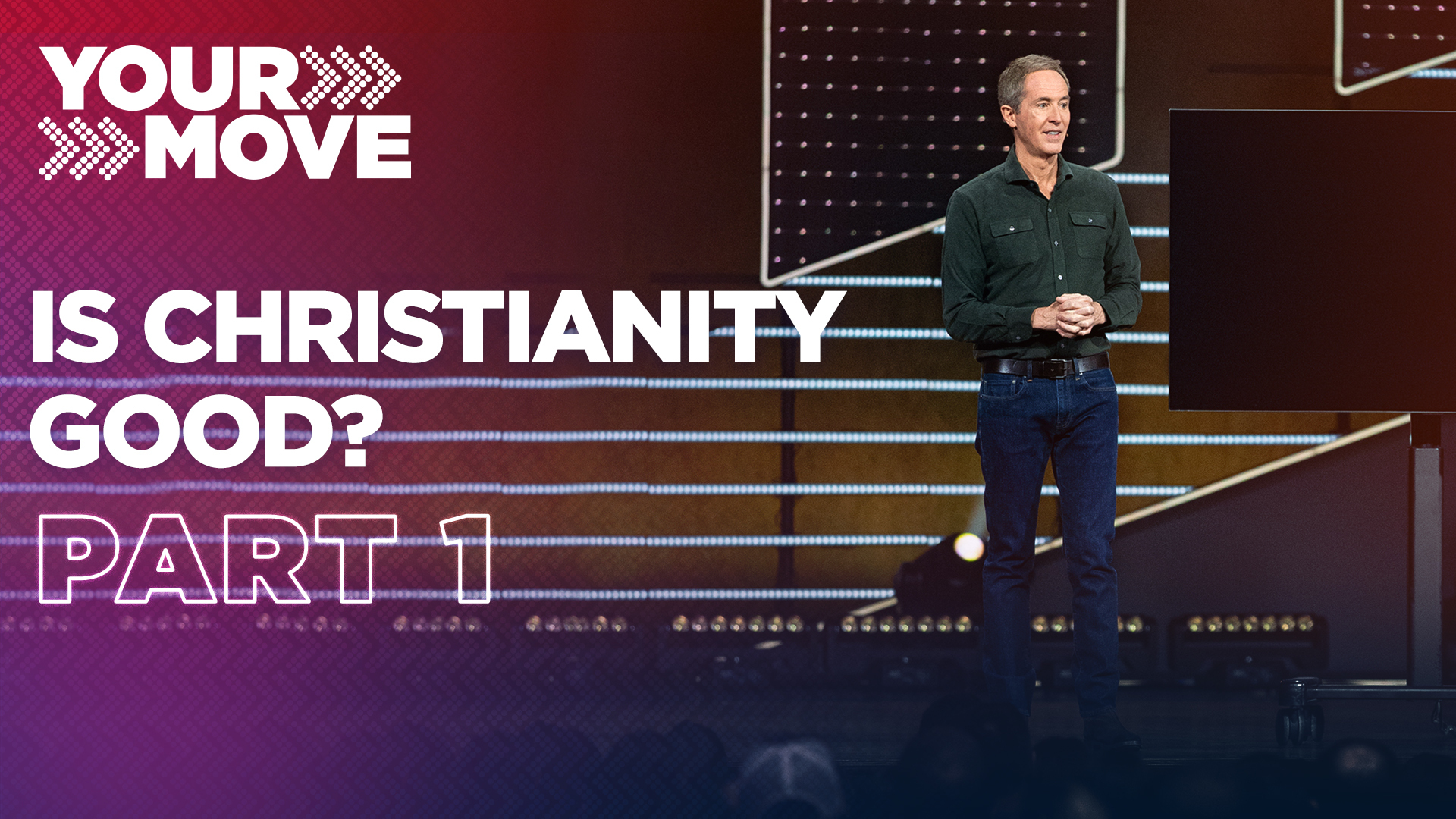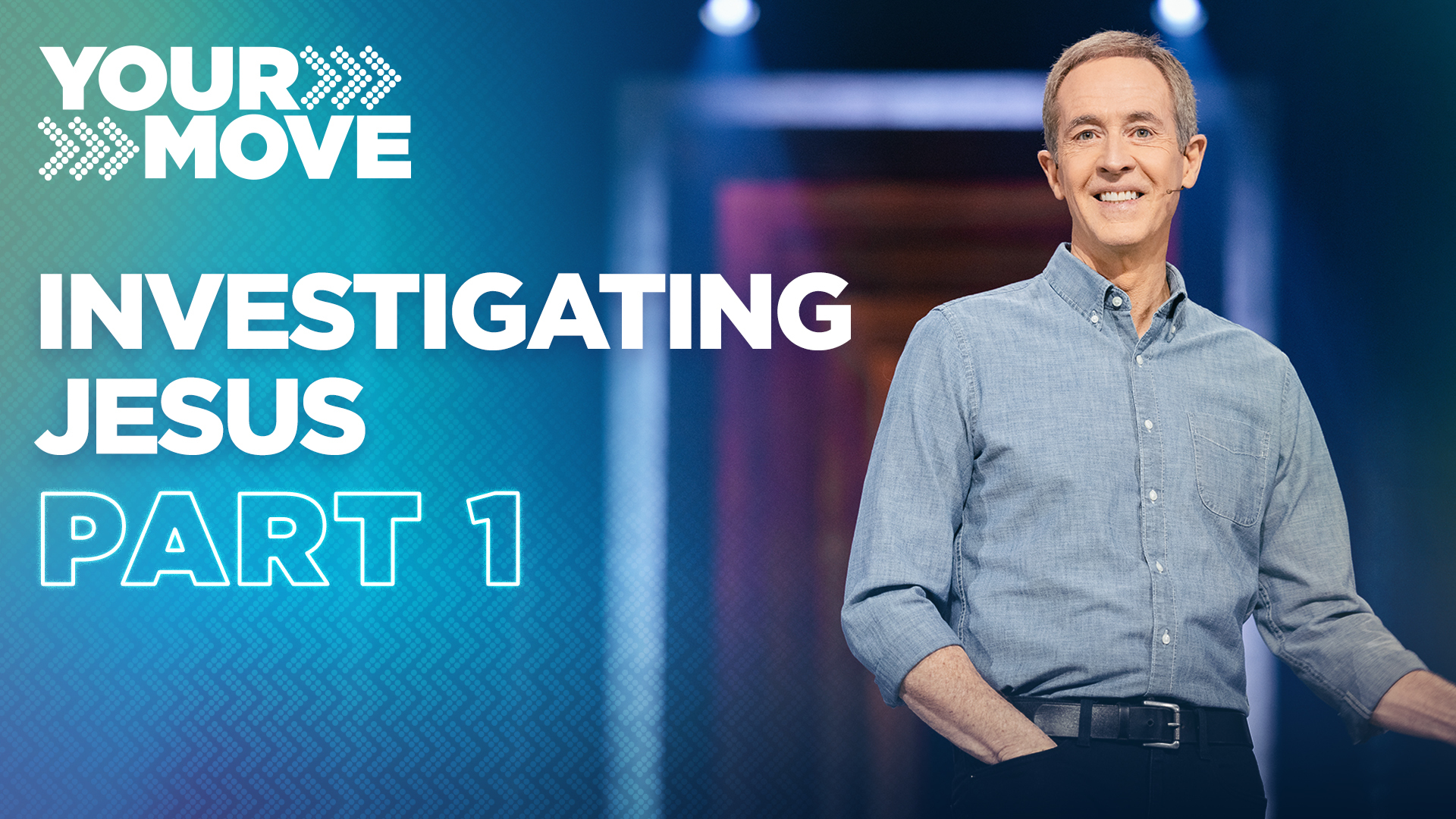Most Americans believe in some sort of heaven, and most believe that good people go there. Sounds nice… but how good is good enough to get us in?
NOTE: The following content is a raw transcript and has not been edited for grammar, punctuation, or word usage.
So there’s a story that was told of a Sunday school teacher who had a group of first graders. And he decided that he wanted to explain to these first graders what they had to do to go to heaven. But he decided before he did that, he wanted to know what they already knew. So he thought he would ask them a series of questions to discover kind of where they were and their understanding of heaven and what it took to go to heaven. So he asked them the first question. He says, okay, kids, if I sold my house and my car and had a big garage sale and gave all the money to the church, would that get me into heaven? And all the kids went, no. He said, all right, second question. If I cleaned the church, if I cleaned the church, mowed the church lawn and kept everything neat and tidy, would that get me into heaven? All the kids are like, no. He said, what about this? What if I’m kind to animals and give candy to children? Would that get me into heaven?And the kids are like, no. And he said, well, then how can I get into heaven?
And the kid in the back stood up and said, you gotta be dead. Anyway, now you know this because you’re part of this statistic. Most Americans believe in heaven. Most Americans believe in some sort of afterlife, a good place, you know? And most Americans, maybe because we’re Americans, most of us believe we’re going there. And there’s a lot of mystery, a lot of questions, you know, a lot of I’m not sure and I don’t know about and don’t ask me to explain it too much. But there’s just this general sense that there is something beyond this life and we refer to it as heaven and it’s a good place. And we just assume we’re gonna go there. And most of us or most people in America, so the United States especially, are confident it’s just gonna work out somehow. But for now I gotta go work out. For now I gotta go to work. I gotta raise my kids. I gotta go to school. I’ve got an exam to study for. I’ve got a meeting to go to.
And the two assumptions that fuel this confidence that most Americans have, the two assumptions are these, that good people go to heaven. And the second assumption is I’m a good person. I’m good enough for sure, right, for heaven. The good people go, bad people, who knows? Don’t wanna think about that, but good people go to heaven. I’m a good person and I’m a busy person. And I’m sure somebody else has figured it out. I don’t have a lot of time to give a lot of thought to that. Now, there are obviously some advantages to this way of thinking that, you know, good people go to heaven, I’m a good person. There are several advantages. One advantage is this, that it’s just or it’s fair. I mean, it only makes sense that good people would go to a good place if there’s a place to go to after this life.
It’s just, it’s fair. Good people should be rewarded for being good in this life. And everybody, for the most part, knows what good is and knows what bad is and knows how to be good. And this whole idea is embedded in just about every religious system in some version or another with some variations. And come on, everybody can’t be wrong. Number two, here’s another advantage, you make the cut, right? Because you’re a good person. In fact, compared to some people, you’re amazing. I mean, you’re an amazing person. And none of us like to admit this because we all hate judgmental people. We don’t wanna be judgmental. But you know, in your quiet moments and your imaginary conversations with yourself, you know you’re better than, and you know you’re better than, and you know you’re better than, I mean, you just meet some people. Now, you meet some people every once in a while, you’re thinking like, wow, they’re like an amazing person, but I’m at least good and I know I’m better than, okay? You don’t say those things out loud. We shouldn’t say those things out loud, but you’re a good person. I mean, you’re a really good person.
In some cases, you’re amazing. The third advantage is that this whole idea of good people go to heaven and you’re a good person and you’re in, is that it supports the notion of a good God. You know, it’s so interesting. There’s virtually no theology of a bad God that we believe in the beginning, a really bad God created the heaven. It’s like the moment people look up and think about God, there’s some sense of, well, God is good. And this, the idea that a good God would want good people in his good heaven or this good afterlife, it just makes sense. And then the other advantage of this, and this is kind of a sort of a backdoor advantage to why this is a good way to think, is that the fear of not going to heaven should motivate people to be good. In fact, the fear of an afterlife or that there’s some cosmic, someone watching or keeping score, actually it’s pretty motivating that there will be some kind of payoff, there will be some kind of reward for being kind and good, and especially sacrificing and giving and being generous and going the extra mile.
In fact, there is, we’ve talked about this before, there’s a sense of ought to that kind of hangs over all of us. Well, you ought to, but you ought to, and then you do things you ought not do and it violates your conscience. And these aren’t rules you made up because if you were making up the rules of ought to, you’d just change the rules so you’d never feel guilty, right? So there’s just this sense of ought to that hovers over all of humanity. And so the idea that I’ll be rewarded for doing what I ought to, especially when it costs me and especially when I didn’t want to do it, there’s a payoff to being extra nice and extra kind and extra self-control. So be good and you’ll go to a good place.
Now, the problem with the good people go to heaven thing is this, that most people who believe that, maybe you’re one of those people, chances are you haven’t given a lot of thought. And I understand why you haven’t given it a lot of thought because you’re busy. And how can we know? And it just sort of hangs out over us. And again, everybody can’t be wrong. And this seems to be some sort of a universal assumption. But on closer examination are when you begin to scratch beneath the comforting surface of, hey, I think good people go to heaven and I’m a good person. The good people go to heaven theory or idea, it breaks down quickly. In fact, because you’re gonna feel like I’m poking fun a little bit and I am, it actually becomes a little bit absurd once you actually start to think about it.
There’s some unsettling realities if you decide to base your eternity or we base our eternity on this thought, this assumption or this myth that came from who knows where to begin with, and this is kind of a big one. The human race has no indisputable agreed upon divinely revealed standard. So if there’s a God that’s gonna let us into heaven because we’re good, then God should have let us know what good is. There should be some universal, like the whole world understands this is good, this is bad, this is right, this is wrong, this is good, this is evil. But there is no multi-generational and that’s the part we forget about. It’s not just a snapshot of this generation, you know, in our year and you know, the modern world. There’s no multi-generational universal set of rules to measure our behavior against. And all of you know enough history to know this. I mean, isn’t it true that the idea of the concept of justice and the concept of morality and the concept of good, it’s been all over the map historically, right? I mean, what was self evidently good 500 years ago, we think is self evidently evil now.
Based on our current Western understanding of the dignity of all people, and our thoughts about slavery, then I’m afraid that maybe nobody before the 16th century went to heaven, except maybe slaves. Because all over the world, it was self evident.
I mean, it was just a duh. It was just an assumption. Some people were born to own and to rule. Other people were born to be owned and to be ruled over. I’m not talking about slavery in the United States. I’m talking about slavery all over the world. I’m talking about all over the world and every single culture, there were slaves. People were owned. Well, we think, goodness, what could be, pardon my grammar, what could be badder than that? I mean, you’ve done some bad things, but I mean, what could possibly be worse than treating a human being as if they’re a possession or treating a human being worse than you treat your cattle? I would just think anybody that did any of that or who even acknowledged that that’s an okay thing or a good thing, or, you know, I’m not rich enough to have slaves, but I hope one day I’m rich enough to have my own slaves. Anybody who thought that way or supported that way of thinking, I mean, that’s so horrible. None of those people should go to heaven, should they? But if that’s the case, before the 16th century, wow, who made it to heaven?
My point is simply this, that good, isn’t it true? Good’s a moving target. It’s a moving target culturally. It’s a moving target generationally. It’s a moving target nationally. And if we’re real honest, it’s a moving target personally because there are things that bother you now that didn’t bother you in an earlier time of your life, in your life. There are things that bother you in this season of life that you consider bad, that once upon a time, you not only, did they not bother you, you just thought they were good. So how do we know what good is? It’s constantly changing. There’s no, there is no consensus. There’s not even consensus in the world in this generation, much less when you take into consideration previous generations. Now, of course, some people wanna say, wait, wait, wait, Andy, you’re the pastor, you’re the preacher, you should know better. The Bible, come on, Andy, the Bible tells us the standard, the Bible gives us the standard, the Bible tells us right from wrong and good and bad. And the Bible is the standard by which we should measure our behavior. And the Bible tells us enough about good to know whether or not we’re good enough to go to heaven.
But I don’t advise you use the Bible because if the Bible is the standard, you do not make the cut. Okay, you know, sometimes people will toss out, well, the 10 commandments, I try to keep the 10 commandments. Now, nobody has these conversations with me anymore because I’m a pastor, nobody wants to talk to me about important stuff, you know. But back when, you know, I was a student and I was in graduate school and I loved, you know, sort of finding these conversations that people toss out, what about the 10 commandments? And I would always say, well, name them.
So you live by the 10 commandments, I do my best to live by the 10 commandments, well, name them. And they could name them if their eternity depended on it and somehow they thought their eternity depended on it. So it’s like, well, I keep the 10 commandments. No, you don’t, nobody in this room keeps the 10 commandments, but that’s okay to think that as long as you don’t know what they are, you know, it’s easy to think you keep them, right?
The 10 commandments shows up in the Old Testament book of Exodus. And in the book of Exodus, the word heaven does not appear anywhere in the entire book of Exodus, except it refers to the heavens like the sky. There is no correlation between the 10 commandments or any of the laws given by God and going to heaven. In fact, the Old Testament doesn’t have any theology of an afterlife. It’s kind of sad, everybody goes to Sheol. Everybody, seeing Sheol, what’s Sheol? I don’t know, it’s just where you go, we don’t know anything about it. That’s the whole Old Testament. And yet in the Old Testament, we find all these rules and all these laws. So the Old Testament is no help, and the 10 commandments are certainly no help because nowhere connected to the 10 commandments is there. If you keep these, here’s what’s gonna happen to you in an afterlife. Now, the New Testament is actually worse because the New Testament is full of stuff about heaven. In fact, in the New Testament, there’s more said about heaven than any other ancient literature that talks about the afterlife by far. There’s so much about eternity and so much about heaven, but the New Testament’s a bit of a tease because in the New Testament, if we’re trying to find a way to work our way to heaven, the message is good luck, you’re doomed.
I mean, here’s what Paul wrote, and Paul was a great Jew. He was a Pharisee. He was like, Paul was one of the goodest, I know it’s not the right, really word. He was one of the goodest of all the good people, and then he becomes a Jesus follower. And when he understands the message of Jesus and when he kind of gets a fuller picture of eternity, here’s what he wrote. He said, there’s no one righteous, not even one. There’s no one good, not even one. He says, now, if you’re not sure what I’m talking about, let me tease it out for you. Therefore, no one, that would be all of us ones, no one will be declared righteous in God’s sight by being good, by the works of the law. That if you find law in the Bible or if you find law anywhere and you think, if I can just keep these laws and if I can be consistent, then I’m gonna be declared righteous and good enough for God, Paul says, you’re kidding yourself. And then there’s this famous statement that many of us heard growing up, if you grew up around church, all have sinned for all have sinned and fallen short of the glory or the presence of God.
The Bible does not, the Bible does not provide us with the standard of conduct that guarantees us heaven, even though there’s so much in the Bible about heaven. So the unsettling reality is we have no established standard. Now, there’s some other problems with this. I’m gonna go through these a little bit quicker. Second problem with the good people go to heaven is we don’t know what percentage of our actions have to be good to make the cut. Is it like a test? Like you have to have 70% good? Or is it 50% good? Is it 20% good? The point is you have no idea. First of all, we don’t even know what good is exactly, and we don’t know what percentage of our deeds have to be good to make the cut to get to heaven. Nobody told us. And here’s one. This is scary. At what age do our deeds start counting? I hope somewhere past 50, right? I don’t want, I mean, right? I mean, when does God start saying, start the ledger sheet?
Oh, oh, oh, oh, oh my goodness. I mean, when does it start? I mean, I know I’m kind of making fun, I’m kind of poking, but shouldn’t we know, come on. If heaven depends on this, shouldn’t the formula and shouldn’t the system be a little bit clearer, right? Number three, you know, we don’t know if thoughts and motives count against this. This is just what we do or why we did what we did. How about this? According to the, you know, good people go, you could be out of time and not know it. You may have done so many bad things that you don’t have enough time to do enough good things to make up for your bad things. I know, and you kind of chuckle, but we don’t know. What if that’s the case? And again, you don’t even know how the bad things measured against each other. I mean, you’re thinking, well, this was super bad. This wasn’t that bad, but you don’t know you’re making that up. You may have done so many bad things that you do not have time to make up for them. And you don’t even know if there’s a way to make up for them.
See, we think, well, my good outweighs my bad. Well, that’s an interesting thought. First of all, you define what’s good and bad. You decide what the scale looks like and you decide which way it tips. But you have no idea if God even has a scale. There may be bad things you do that just you’re out, period, no matter how many good things you do. But what if you’re out of time? You could be doomed and not know it, which means you’re being good for nothing. You’re trying to be a good person going, did you see it? Did you see it? Did you see it? Could you not think about that? Could you see it? And you could be doing all this good stuff for nothing because it doesn’t count because you’ve already done so many bad things. You say, Andy, this is kind of absurd. I know. You scratch beneath the surface of the good people go to heaven idea and it falls completely apart. And then here’s another one.
You could miss heaven by one good deed. I mean, there’s gotta be a cutoff, right? I mean, there’s gotta be a group that’s, you were so close, sorry. You were, I know it’s kind of silly.
But here’s the really big problem with the whole system. I want you to think about this. If good people go to heaven, if there’s some cosmic scale, if that’s how it really works, if good people go to heaven, but God never took the time to explain to us what good is and how it works. And if it’s a percentage, do motives count? If all of that is a complete mystery and our eternity depends on it, well then God is not good. I mean, what do you call a teacher? What do you call a teacher who doesn’t give you any notes or any reading assignments, just a final exam and never post the date of the final exam? You don’t call that a good teacher. Or what about this? What about a road race? Like, you know, a race that you run in. What about a road race where the race officials don’t post signs marking out the path of the race. They don’t even publicize the distance that you have to run and they establish the finish line after the race has already begun. That’s not good. That’s not fair. And that’s not just. But if good people go to heaven, that’s the situation. That’s the situation. If good people go to heaven, then God is not good by the way we measure good. God is not just by the way we measure justice. And God is not fair by the way we measure fairness. And our understanding of goodness, justice, and fairness is the system we’re operating off of trying to earn our way to heaven. What if God has a very different view of goodness and justice and fairness? And what if he refused or failed to reveal that? Now, that’s what some people believe. But the point is simply this. Scratch beneath the surface, examine this whole view carefully, and it becomes absurd. It falls apart.
It breaks down. We’re supposed to be good so we can go be with a good God who never defined the terms, who failed to tell us how good is good enough. Because if God is good, if God is good the way we understand good, he should show up. He should show up every generation or so and give us the updated version of good Because come on, with technology, good has changed. I mean, there are whole categories of crimes that didn’t exist 100 years ago or 500 years ago. I mean, the world is a different place. So this is really important. It’s really important because how do we sleep at night?
What do we say at funerals? I mean, when you do what I do, you’re a little bit in the funeral business. I’ve done hundreds, I guess, of funerals, all kinds of funerals. What do you say at funerals?
Joe was a really good man. He was good enough for us. I hope he was good enough for heaven. Let’s pray to the God who left us all spinning in the wind and wondering where we stand in terms of eternity. Who, what do we tell our children? What are we supposed to tell our children? I sort of looked around to find out what do people tell their children? I ran across this article by psychoanalyst and author, Erica Komisar. I’d never heard of her before, but I read this fascinating article and here’s what she wrote. She said, I’m often asked by parents, how do I talk to my child about death if I don’t believe in God or heaven, which she doesn’t? And my answer is always the same, she says, lie. Lie, why lie? She says, because the idea that you simply die and turn to dust may work for some adults, not many adults, by the way, may work for some adults, but it doesn’t help children. Ready for this? Believing in heaven helps them grapple with the tremendous and incomprehensible loss. So we lie, we just make stuff up, just wishful thinking. And when we mourn, we don’t mourn with hope, we mourn with, I don’t know.
Now, I know, you’re thinking, you’re having arguments with me in your head. There are options to the good people go to heaven theory. Here’s one, there’s the God decides view. It’s kind of God wills it, God just chooses. You’re in, you’re out, you’re in, you’re out. God just decides, and who are you to argue with God? It’s like, well, I’d like to at least have a conversation. My eternity depends on it all. How about my children? What do you mean I can’t argue with God, talk to God? Nope, God just wills it. He chooses who he wills and he dooms who he wants to doom. And that’s the end of that. And then there’s this view, these are my words. This isn’t like an official view, but there’s, this is what I call it.
There’s the you wouldn’t recognize good if it bit you view. That is that you are so depraved, that we’re so depraved that we are deprived of the ability to even recognize good or know good from evil. So there’s no point in God telling us the good that we have to do because we’re too depraved and deprived to even recognize the good and we don’t have the power to do it.
According to Jesus, good people don’t go to heaven. According to Jesus, it’s the very opposite of what most people who believe there’s a heaven actually think and believe. And the fact that Jesus didn’t believe that good people go to heaven, that doesn’t necessarily make it true. That’s just what he taught. And that’s what he said. Clearly it’s what he believed. But at the same time, and here’s the gotcha, here’s the strange thing, here’s the sit up straight and pay attention, here’s the, wow, you know, that’s something to consider. Jesus did not teach that good people go to heaven, but Jesus instructed his followers to be good. And more than that, to do good. To be good and to do good to each other and to be good and to do good to their enemies.
Which means Jesus believed we are capable of doing good. And Jesus believed that we’re able to recognize the difference between good and bad, good and evil. What’s good for another person and what’s not good for another person. So he instructed his followers to do good and to be good, even to the people who mistreat them. And he said, here’s how good I want you to be. I want you to be as good as my father in heaven, but not so you’ll go to heaven. Nothing Jesus taught, nothing Jesus illustrated, nothing Jesus parablelized points to the fact that somewhere there’s a magic list, there’s a list. And yet at the same time, he instructed his followers to be good. And not only did he instruct them to be good, if you’ve read the Sermon on the Mount, he took good to a whole nother level. He took good to such a level that the best people, the goodest people, the Pharisees and the teachers of the law, they found themselves condemned under Jesus teaching as not even being good enough to keep their own laws.
And yet never once did Jesus infer that if you’re good enough, you’ll spend eternity in heaven. And then, you know, the end of this story, the good people, Pharisees, teachers of the law, law keepers, and the bad people, Romans, they conspired together and they killed him. They crucified him. But he had the final word because from the cross, it’s so amazing, from the cross, he said to a very bad man, I will see you on the other side. If Jesus is who his first century followers claimed he is, that’s really good news. You don’t have to lie to your children. You don’t have to lie to your grandchildren.
Let me tell you what’s good news. And again, this is my world. When you lose a loved one, you can grieve with hope. You can full on grief with hope. I’ve done so many funerals and most of the funerals I do, I’m surrounded by Jesus followers who grieve with hope. But I’ve done some gravesides and I’ve done some funerals where it was all grief, very little hope. If good people go to heaven and you have no idea how the system works, there’s not much hope. And yet the followers of Jesus stated clearly, you can grieve with hope. If Jesus was correct, God so loved the world that he showed up. And he didn’t have to show up every generation to update the rules. He showed up one time to show us the way, to tell us the way. And then when Jesus was questioned, as blasphemous as this was, he said, fellas, I am the way. Instead of giving us a list, God gave us himself. For God so loved the world that he gave.
His one and only son. That whoever behaves like him, that whoever behaves correctly, whoever does more good than bad, no. This is why you gotta take Jesus out of the equation. The good people go to heaven equation. Whoever puts their trust in him, whoever puts their trust in him, believes in him, that person will not be lost to God regardless of what they’ve done or didn’t do.
Will not be lost to God or your English texts will not perish, but they’ll have something the Old Testament never refers to. In the context of life after death, you’ll have eternal life. If Jesus was correct, this is amazing. And let me tell you who wrote this, okay? This is John. I say this all the time, but I’m gonna keep saying it. This is John who spent three and a half years with Jesus, saw the whole thing. John who took care of
Mary until Mary passes away later. John tells us, look, I’m like Peter, I’m like the rest of the guys. I came into this story assuming that we had to keep the law and we didn’t know what happened after the life. We know we all went to Sheol, but we hope God sorted it out and there was something good and there was gonna be a resurrection someday and there was gonna be a judgment and we hope we made it. But there was no confidence, there was no assurance. We were just doing the best we could. And then we sat under the teaching of Jesus for three and a half years and it was completely different, completely different. And here’s what we learned. If Jesus is correct, God is not trying to catch us doing wrong to condemn us. He says, for God did not send Jesus into the world to catch people doing wrong and to condemn people for doing wrong or to condemn the world, but to save the world.
And John would tell us, and here’s how he’s gonna do it. Not by updating a list every generation. He’s gonna do it through him. That he only needed to come one time because he didn’t give us a to-do list. He gave us a who and invited all of us to place our trust in him. And that all of our evil and bad, unintentional deeds, regardless of motive and upbringing and context and everything else, that that would be paid for and wiped away. So that we could mourn with assurance that we wouldn’t have to lie to our kids and so that you can lay in bed at night and stare at the ceiling and know that things are good between you and God and it has nothing to do with what you did.





